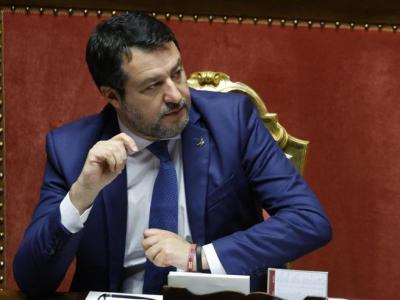Salvini urges 'no clemency' after gang rape in Catania

ROME — The alleged rape of a 13-year-old girl by seven Egyptian nationals last week in Catania has reinvigorated right-wing calls for a crackdown on immigration and harsher punishments for sex offenders. “Do not come to me talking about ‘tolerance’ or ‘mistakes,’" deputy prime minister and minister of infrastructure and transport Matteo Salvini wrote in a statement Sunday. “There can be no clemency in the face of horrors like these.”
Police said the victim and her 17-year-old boyfriend were walking in Villa Bellini, Catania’s largest public park, when seven young men began harassing them. The group allegedly forced the couple into the park’s public restroom. There, two of the boys assaulted the girl. The others blocked the exit, restrained her boyfriend, and forced him to watch.
After a half-hour struggle, the victim and her boyfriend broke free. Passersby on Catania’s Via Etnea helped them alert carabinieri to the crime.
Within 24 hours Catania prosecutors had charged seven suspects with group sexual assault. Two confessed to and cooperated with investigators, and DNA analysis linked three to the scene of the crime. The victim positively identified the two men who raped her and one who pinned her down. Her boyfriend identified the four remaining members of the group.
The seven alleged perpetrators range from 15 to 19 years old. The three minors in the group are detained at Catania’s juvenile detention center. Three of the adults among them are being held at Catania’s Piazza Lanza prison. One is under house arrest.
Each of the seven crossed illegally from Egypt to Sicily by barge between November 2021 and March 2023. Italian immigration police could not deport them because of a measure passed by former prime minister Paolo Gentiloni’s government in 2017: the legge Zampa, which guarantees unaccompanied foreign minors’ right to stay on Italian soil until they are of age, and clears them a path — conditional on good behavior — to residence in adulthood.
The suspects lived together in a shelter designated for youth protected by the legge Zampa. At the shelter they received Italian lessons, trade training, apprenticeships and, ultimately, jobs mainly in the catering, construction, and tourism industries, staff members said. The two alleged perpetrators who cooperated with law enforcement were both awaiting visas which would have allowed them to stay longterm in the country.
This is the latest in a recent string of gang rapes in Italy. Last July in Palermo, seven young men filmed themselves raping a 19-year-old woman. In late August, the case of nine boys who repeatedly raped two 10- and 12-year-old cousins in Caivano, a city northeast of Naples, garnered national outrage.
Prime minister Giorgia Meloni has largely treated the rapes as law-and-order issues rather than gendered ones. She promised in a September visit to Caivano to expand the local police force and to spearhead a crackdown on “criminality, illegality, drugs.” In a planned visit to Catania last weekend, Meloni assured the victim's family that “the State is here, and will ensure that justice will be served.”
Deputy prime minister Salvini responded to news of the Catania attack with renewed calls for a right-wing policy point. “There is only one cure” for the seven rapists, he wrote in his Sunday statement: “Chemical castration.”
In 2018 and 2019, Meloni’s Fratelli d’Italia proposed decreeing chemical castration — a hormone therapy which blocks testosterone production — a condition for parole for convicted “pedophiles and recidivist rapists, in addition to the current penalties provided.” This September, Lega Nord introduced a Senate bill which would force all repeat sex offenders or offenders with child victims to undergo the procedure w prison time. Currently a handful of countries including South Korea, Pakistan, and Poland allow coerced chemical castration for sex offenders.
The proposals, and the bill, have gained little traction. At every juncture Lega and Fratelli d’Italia have been stymied by the Partito Democratico, whose members favor an education-based approach to preventing sex crimes. “Shrieking” about chemical castration “may yield some easy political consensus, but it solves absolutely nothing,” said president of the chamber of deputies Laura Boldrini last summer.
Salvini wrote on Sunday that he counts on Lega’s bill “to be voted on as soon as possible.” All seven of the boys arrived on Italian soil during one of the largest waves of migration from North Africa to Sicily on record. The influx has strained resources and inflamed tensions in the region.
Conservatives have seized on the Catania case as well as an anti-immigration cautionary tale. It shows that what Lega has “always said on the issue of immigration was not demagoguery,” said Antonio Carrà, Lega's Sicilian deputy secretary. Specifically regarding the entry of minors into Italy, Carrà said, “The national policy pursued over the past decades by the left on immigration, security and justice has failed. The State must be strong in controlling the borders.”
© COPYRIGHT ITALIAN INSIDER
UNAUTHORISED REPRODUCTION FORBIDDEN


